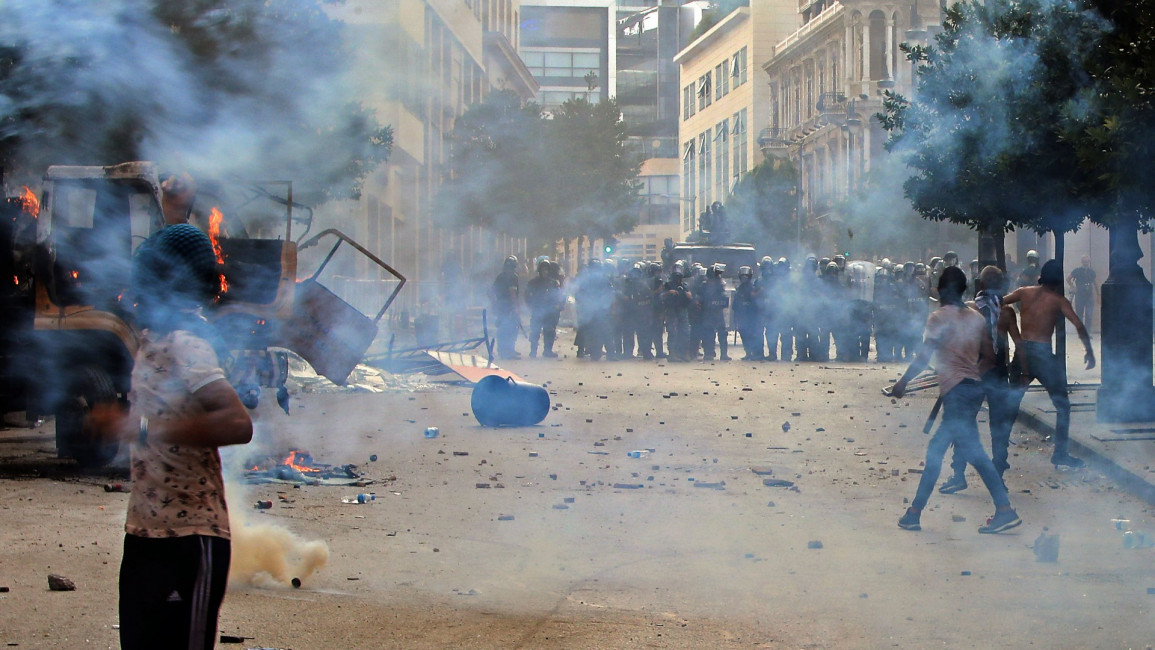'Illegal force' used on protesters in Lebanon, including live ammunition: HRW
Lebanon's security forces have been accused of using excessive and lethal force on protesters after the explosion at the port of Beirut, according to a Human Rights Watch report released today.
A policeman was killed and more than 728 people were injured in protests in central Beirut earlier this month after Lebanese took to the streets to demand accountability for a deadly blast in the capital which killed over 180 people and injured thousands.
Live ammunition, metal pellets, and kinetic impact projectiles such as rubber balls, were fired by security forces against the mostly peaceful crowds, including health workers, the HRW report says.
Lebanese police also used "excessive" quantities of tear gas, some directly hitting protesters and landing on first aid stations, according to the same report.
"Instead of lending a helping hand to fellow Beirutis still digging themselves out of the explosion debris, Lebanon’s security apparatus made a fist and pummeled protesters with shocking amounts of violence," said Michael Page, deputy Middle East director at HRW.
"Such unlawful and excessive force against mostly peaceful protesters shows the callous disregard of the authorities for their own people."
Some demonstrators broke into government buildings and ministries during the protests, decrying state officials for not avoiding the tragedy that cost 181 lives and made 300,000 homeless.
Documents emerged that showed the country’s top leadership and security officials were aware of the chemicals being stored in the city port, fuelling widespread anger at the ruling class.
Twitter Post
|
The report claims security forces threw stones at protesters and beat them, citing the involvement of the country's Parliament Police, the Internal Security Forces (ISF), the Lebanese Armed Forces (LAF), and unidentified forces in civilian clothing.
"International standards stipulate that security forces should use the minimum necessary force at all times," stated the report.
"Law enforcement officers may only intentionally make lethal use of firearms when strictly unavoidable in order to protect life. Live ammunition should not be used unless required to protect life or prevent serious injury."
The rights group interviewed 25 people between 8 and 18 August and collected photo evidence of these abuses.
"Security forces should immediately end the use of shotgun-fired metal pellets and other indiscriminate area-fire ammunition, and the public prosecutor should open an independent investigation into the abuses and make the results public," the report recommended.
"International donors to Lebanese security forces should investigate whether their support is going to abusive units, and if so, halt it immediately," it said.
It cited international donors such as the United States, United Kingdom, and France.
No comments were made in response to this report by the relevant Lebanese authorities, but on 9 August the army said "none of the soldiers opened fire with live ammunition toward protesters".
The ISF claimed it did not fire live ammunition and rubber bullets, while the Parliament Police also denied shooting at protesters.
The ISF said its policeman died whilst trying to save the lives of people trapped in a hotel and claimed 70 of its forces had been injured.
The army also claimed 105 of its soldiers suffered injuries, with two falling into critical condition.
HRW's findings match claims made in an Amnesty International report that Lebanon's army and security forces, as well as undercover forces in civilian clothing, shot at unarmed crowds during the same demonstrations.
The massive Beirut blast which was felt across the country and as far as the island of Cyprus, doing huge damage to homes in the capital.
It was recorded by the sensors of the American Institute of Geophysics (USGS) as having the power of a magnitude 3.3 earthquake.
It was triggered by a fire in a port warehouse, where a huge shipment of hazardous ammonium nitrate, a chemical that can be used as a fertiliser or as an explosive, had languished for years, according to authorities.
The huge blast also wounded at least 6,000 people and displaced more than 300,000 from their destroyed or damaged homes.
Follow us on Facebook, Twitter and Instagram to stay connected



